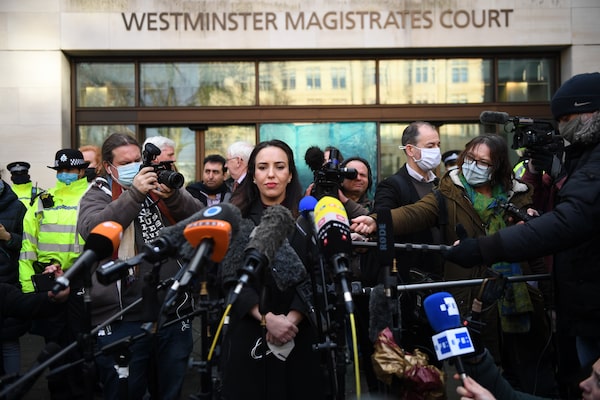
Stella Moris, fiancée of Julian Assange, prepares to give a statement outside Westminster Magistrates’ Court in London on Wednesday, Jan 6, 2021, after he was refused bail.Chris Ratcliffe/Getty Images
A British judge has refused to release WikiLeaks founder Julian Assange on bail even though his extradition to the United States has been blocked.
District Justice Vanessa Baraitser noted on Wednesday that U.S. prosecutors have appealed her decision not to hand over Mr. Assange to face criminal charges including espionage. She said that while that appeal is pending, Mr. Assange must remain in jail.
“As far as Mr. Assange is concerned this case has not yet been won,” the judge said. “Mr. Assange still has an incentive to abscond on these as yet unresolved proceedings … Mr. Assange has already demonstrated that has been willing to flout the order of this court.”
The judge noted that Mr. Assange skipped bail in 2012 when he sought refuge in the Ecuadoran embassy in London after a British court granted his extradition to Sweden to stand trial on sexual assault charges. Mr. Assange denied the Swedish allegations but feared that he would be turned over to U.S. prosecutors.
He was forced out of the embassy in 2019, when Ecuador said he violated the conditions of his asylum. London police immediately arrested him for skipping bail and although the Swedish case was later dropped, Mr. Assange was sentenced to 50 weeks in prison by a British judge for the bail violation. He has remained in jail throughout the current extradition process.
Mr. Assange faces an 18-count indictment in the U.S. which includes 17 violations of the Espionage Act, a 103-year-old law that prohibits anyone from unlawfully obtaining and publishing information relating to national defence.
All of the charges related to the publication by WikiLeaks of more than 250,000 secret military cables, reports and briefing notes in 2010 and 2011.The material exposed atrocities by U.S. soldiers in Afghanistan and Iraq and led to an outcry over American foreign policy.
On Monday, Judge Baraitser ruled that Mr. Assange should not be extradited to the U.S. because of humanitarian concerns. The judge said that if convicted, Mr. Assange would be imprisoned in a supermaximum facility in Florence, Colo., called ADX Florence, where isolation is extreme and mental-health services are limited. “He faces these prospects as someone with a diagnosis of clinical depression and persistent thoughts of suicide,” the judge ruled.
Lawyers representing U.S. Department of Justice plan to appeal the ruling and on Wednesday they began to outline their case. Clair Dobbin, a London lawyer representing the DOJ, told Judge Baraitser that the DOJ will argue the U.S. prison system has the resources to treat Mr. Assange and that his mental health issues are not as severe as defence lawyers suggested.
Ms. Dobbin also argued that Mr. Assange should be denied bail given his past conduct. She noted that Mr. Assange helped U.S. whistleblower Edward Snowden seek asylum in Russia. And she said that after Monday’s ruling, Mexico’s President Andres Manuel Lopez Obrador offered asylum to Mr. Assange.
Mr. Assange’s lawyer Edward Fitzgerald argued the judge’s ruling on extradition changed everything and that he should be released. “This court has given a decision and the decision has been that he should be discharged,” he argued. Mr. Fitzgerald said Mr. Assange could be held under house arrest and monitored electronically while the appeal moves forward.
Judge Baraitser agreed with lawyers for the DOJ and said Mr. Assange was a flight risk. “I am satisfied that there are substantial grounds for believing that if Mr. Assange was released today he would fail to surrender to court to face the appeal proceedings,” she said.
Our Morning Update and Evening Update newsletters are written by Globe editors, giving you a concise summary of the day’s most important headlines. Sign up today.
 Paul Waldie
Paul Waldie